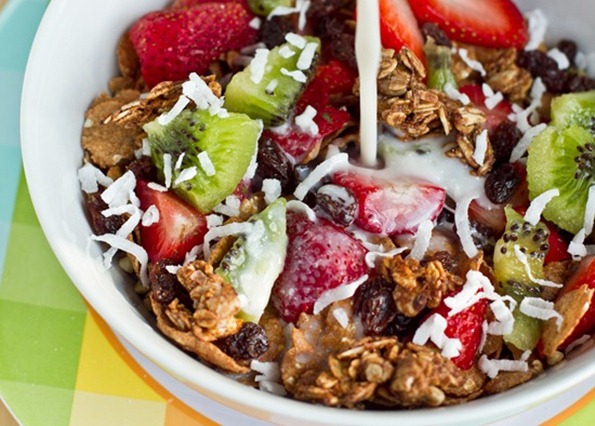Catching up?
- Vegan How To: Introduction (Why this series?)
- Part 1: How To Make The Transition

Part 2: Replacing Dairy Milk
Today I?d like to talk about one of the first changes that I made in my own personal journey ? switching from cow?s milk to non-dairy milk. It was also one of the easiest changes I made thanks to a huge selection of non-dairy milks on the market. I?m always amazed when I see the mammoth wall of non-dairy milk in my grocery store. It?s taking over! There?s really something for everyone from almond milk to flax milk and everything in between.
And, boy, I?ve tried a lot. Here is a list of the non-dairy milks I?ve given a go:
- Soy milk
- Almond milk
- Hemp milk
- Oat milk
- Coconut milk
- Rice milk
- Almond-coconut milk
- Quinoa Milk
- Flax milk
I?ll admit, I?m not head over heels for all of them, but I have a few favourites that keep me more than happy.
My personal favourite non-dairy milks:
1. Almond Milk (Whole Foods 365 Organic)
2. Soy Milk (Edensoy Organic) ? for the protein
Soy milk was the first milk I tried back in 2008/2009 and while I didn?t fall head over heels initially, it eventually grew on my taste buds with time. (Actually, it wasn?t the first time I had soy milk; I was allergic to cow?s milk formula when I was a baby and my mom had to put me on soy milk instead). Soy milk is also the only non-dairy milk (to my knowledge) that has a similar nutritional profile to cow?s milk. My go-to brand of soy milk, Edensoy Organic, has a whopping 12 grams of protein per 1 cup serving making it the soy milk with the highest protein content. The ingredient list is also impressive: just organic soybeans and purified water! It?s great for smoothies when you don?t want to add protein powder, but still want a kick of protein. To be honest, the flavour of it unsweetened isn?t my favourite, but when I mix it into other foods I don?t notice it as much. They also have sweetened varieties of course. No matter the brand you buy, look for organic, GMO-free soy milk whenever possible.
Here is a side-by-side comparison of Edensoy soy milk vs. 2% cow?s milk:
| Nutrition Facts (per 8 fl oz serving) | Unsweetened Soy Milk (Edensoy) | 2% Cow?s milk |
| Calories | 120 cals | 122 cals |
| Total fat | 6 grams | 5 grams |
| Saturated fat | 1 gram | 3 grams |
| Cholesterol | 0 mg | 20 mg |
| Sodium | 5 mg | 100 mg |
| Potassium | 460 mg | 366 mg |
| Total carbohydrate | 5 grams | 11.5 grams |
| Dietary fibre | 0 gram | 0 gram |
| Sugars | 2 grams | 12 grams |
| Protein | 12 grams | 8 grams |
?
Almond milk. I obviously have a lot of love for this non-dairy milk and it seems to be taking over the world. Almond milk is creamy, deliciously nutty, and blends well into just about anything. My brand of choice is Whole Foods 365 as it is carrageenan free. Almond milk is very low in protein, so be sure to pair it with protein rich vegan foods like hemp seed, chia seed, beans/legumes, protein powder, etc.
Note: Please see my post, Carrageenan in Our Foods for a list of dairy and non-dairy products that contain this potentially harmful ingredient.
What about calcium?
A balanced vegan diet can actually be quite high in calcium even without a lick of dairy. My favourite example ? 1 ounce of chia seeds (about 2.5 tbsp) has reportedly 300 mg of calcium. Other non-dairy foods high in calcium include: collard greens (357mg calcium), fortified soymilk (368 mg), black eyed peas (211 mg), firm tofu (204mg), calcium fortified OJ (200mg), blackstrap molasses (172mg), baked beans (154mg), kale (94mg), almonds (70mg) [per serving, source] Be sure to pair calcium rich foods with vitamin C and D rich foods for the best absorption. As extra insurance, I take calcium and vitamin D supplements daily. There are also fortified non-dairy milks on the market (I think these tend to be the refrigerated kind?), so that is an option too. Be sure to read your labels!
Sweetened or unsweetened?
When I started experimenting with non-dairy milk, I always bought the lightly sweetened option. I think this really helped with my transition. Once I got used to the change, I switched to unsweetened varieties. As I?ve said many times in the past, its amazing what the taste buds can get used to with time. If you are starting out, you might want to check out the lightly sweetened varieties to help with your transition. Another option is to make the transition gradual. Having cereal? Why not try subbing half the cow?s milk with non-dairy milk? Or try using creamy almond milk or coconut milk in a cup of tea. There are plenty of ways to gradually ease into the taste.
When I?m doing any savoury cooking, I always use unflavoured and unsweetened almond milk. Keep the vanilla flavoured milk for your sweet recipes and smoothies.
Ok, now I?ll pass it over to you guys!
Have you made the switch from cow?s milk to non-dairy? Was it difficult?
If you drink non-dairy milk, which varieties do you like the best?
Do you prefer sweetened or unsweetened?
Coming up, a homemade nut milk bonanza!
Source: http://ohsheglows.com/2013/01/07/vegan-how-to-replacing-dairy-milk/
born this way foundation lytro camera lytro camera andrew brietbart branson mo monkees songs rail gun
No comments:
Post a Comment
Note: Only a member of this blog may post a comment.